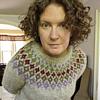Take a photo of a barcode or cover
didn't like this book at first. it has so many layers that I don't think I even picked up on yet
If you're the type of reader who gets satisfaction from a book's cleverness, then this will probably be a good read for you. But, if you want to be entertained, if you want a plot that moves and makes you want to stay awake just another half an hour longer to keep reading, and if you want to encounter characters that are well-developed and engaging, then this is not the book for you. Throughout the book I felt as if I were reading the dialogue from a play written by first-year drama students, which works as a plot device, but it does not make for enjoyable reading.
probably not for everyone because its less plot driven and more meta, BUT the writing is beautiful and the themes are so well done & I like being confused
I can't stand another second of this terrible fucking book. Christ, you can practically feel how intelligent the author thinks herself.
This is a book about real things and what people imagine. Or, it is a book about imaginary things that have some basis in reality. This is a book about the way people are. Or, this is a book about the way people want to be. Masks or faces? That is the overall question of this book. Like The Illuminaries, this book took a good 150 pages to really get into. I was enjoying the ride, but not compelled to read it. Then, suddenly, BAM I WAS IN. And once you're in, you're definitely enjoying yourself. This book tries and tries again to throw you out (picture- a wooden roller coaster). You're reading and then suddenly are like "there's no way she said that" or "no 17 year old talks like that". But, that's the point. Catton puts words to our deepest feelings--and they're good words. In the end, I care less about what actually happened in the book and more about how I feel about what might have happened. And that, ladies and gentlemen, is the point (I think).
I started reading this one on vacation in a jetlagged haze and wasn’t paying close enough attention to grasp the sequence of events. Namely that part of the storyline is linear while the other part jumps around. I had to retrace my steps and fill in some gaps at the halfway point upon realizing this. The story’s engaging enough that it really didn’t detract from my enjoyment and only enhanced it later on once I recalibrated. I love the blurring of fiction and reality and the duality of characters as they slip in and out of roles. I love the figurative stage Catton sets for us and the way she subtly reveals a multitude of layers beneath every surface. Clever and amusing.
I loved The Luminaries, which might just be The Great New Zealand Novel. Eleanor Catton wrote the Luminaries after this book, and she it seems she really improved in her craft between the two. A couple of stories are blended together here, one of a first year drama school student, the other of a schoolgirl whose sister had a relationship with a teacher. The two come together in the final quarter, and yet the payoff of the ending seems muddled, muted. It’s never entirely clear which parts are real, which are fiction. I enjoyed the drama school drama, modeled on Wellington’s Toi Whakaari, the cradle of most Shortland Street actors.
I think I admired this book more than I loved it. But there’s so much to admire - I’ve never quite read anything like it. After devouring Birnham Wood last year I am now all in for anything Catton writes.
challenging
dark
reflective
medium-paced
Plot or Character Driven:
Character
Strong character development:
Complicated
Loveable characters:
Complicated
Diverse cast of characters:
No
Flaws of characters a main focus:
Complicated
There were certain passages I really liked for the ways Catton portrayed & explored girlhood & sexuality in particular. Overall I never fully invested in any of the characters or the plot, but there were parts I enjoyed & I appreciate the nonlinear narrative, which is always a risky structure. It left me thinking about (and trying to make sense of) the themes and subtexts of vicariousness, identity, and desire in some complex ways. Its biggest strength was it's narrative form & thematic tensions, rather than plot.






